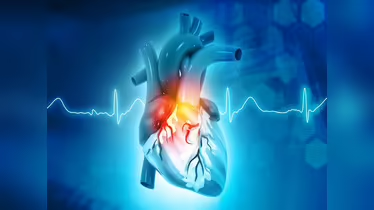
Feeling low on energy, even after getting good sleep and eating well, is a common complaint in today’s busy lifestyle. But what many people don’t realize is that low energy levels might not always be about sleep or food—it could be about what’s missing from your diet. A well-known cardiologist recently pointed out that Vitamin B12 is the ‘unsung hero’ of energy and plays a vital role in how we feel every day. While many of us talk about iron or protein for energy, Vitamin B12 quietly supports some of the most important functions in our body and keeps us feeling active, alert, and focused.
Understanding Vitamin B12 and Its Vital Role
Vitamin B12, also known as cobalamin, is a powerful water-soluble vitamin that our body needs to perform several life-supporting functions. It helps in producing red blood cells, supports a healthy nervous system, and is essential for brain function and DNA synthesis. Most importantly, it converts the food we eat into usable energy. Without sufficient B12, even a healthy diet can fail to give us the boost we need to get through the day.
Unlike other nutrients, Vitamin B12 is stored in the liver, and a deficiency may not show up immediately. But when it does, the effects can be draining—literally and mentally. From low stamina and poor concentration to memory lapses and mood swings, B12 impacts both physical vitality and mental clarity.
How Vitamin B12 Boosts Your Energy Levels
One of the primary reasons Vitamin B12 is essential for energy production is because of its ability to help in the formation of red blood cells. These cells carry oxygen throughout the body. When your body doesn’t get enough oxygen, you feel tired, sluggish, and weak. Vitamin B12 also plays a role in converting carbohydrates into glucose, which is the body’s main source of fuel. So, if you’re always feeling exhausted, it might not just be the result of stress or overwork—it could be because your cells aren’t producing energy efficiently due to B12 deficiency.
Another crucial function is its role in supporting the nervous system. Vitamin B12 helps maintain the myelin sheath, a protective layer around nerves that allows messages to travel smoothly between the brain and the body. If this communication breaks down, you may feel confused, forgetful, or experience strange sensations like tingling or numbness in your hands or feet.
Why So Many People Are Deficient in Vitamin B12
Even though Vitamin B12 is available in many common foods, deficiency is surprisingly common. One major reason is that Vitamin B12 is mostly found in animal-based foods like meat, dairy, and eggs. This means that vegetarians and vegans are at a higher risk. Older adults are also more likely to develop a deficiency due to reduced stomach acid, which is necessary to absorb B12 from food.
Medical conditions like Crohn’s disease, celiac disease, and gastritis can also interfere with the absorption of B12. Even certain medications, such as metformin for diabetes or proton pump inhibitors (PPIs) for acid reflux, can reduce B12 levels over time. This is why it’s important to be aware of the symptoms and get regular check-ups if you belong to any of these groups.
Symptoms That Could Signal a B12 Deficiency
A Vitamin B12 deficiency often develops slowly, making it hard to detect early. However, some signs should not be ignored. One of the most common symptoms is constant fatigue that doesn’t improve with rest. You may also feel dizzy or lightheaded, experience shortness of breath, or notice that your skin looks pale or yellowish. Some people report a rapid heartbeat or palpitations, which happen because the heart is working harder to supply oxygen to the body.
Other symptoms can affect your nervous system, like a tingling sensation in the hands and feet, difficulty concentrating, or memory problems. Mental health can also be impacted—low B12 levels have been linked to depression, irritability, and mood swings. If these symptoms sound familiar, it’s a good idea to ask your doctor for a Vitamin B12 test.
Daily Requirement and How Much B12 You Actually Need
According to nutrition experts and global health organizations, the recommended daily intake (RDI) of Vitamin B12 for most adults is around 2.4 micrograms (mcg). Pregnant women should aim for 2.6 mcg, while breastfeeding mothers need about 2.8 mcg per day. While this might seem like a small amount, a deficiency can still occur if the body isn’t absorbing it properly or if your diet lacks natural sources.
It’s important to note that older adults may need higher amounts or supplemental forms of B12 because of declining absorption abilities with age. Also, those with chronic health conditions, especially digestive disorders, should consult a healthcare provider about their specific needs.
The Heart and B12: What Cardiologists Say
Beyond energy, Vitamin B12 also plays a protective role in heart health, which is why cardiologists emphasize its importance. One way it supports the heart is by reducing levels of homocysteine, an amino acid in the blood that, when elevated, can damage blood vessels and increase the risk of heart disease and stroke. Keeping Vitamin B12 levels optimal is now considered a preventive strategy in cardiovascular care, especially for those with a family history of heart disease.
The cardiologist who recently brought attention to this described B12 as a “silent strengthening” of both energy and heart vitality, especially in people above 40 who often overlook micronutrients in favor of major lifestyle changes.
Where You Can Get Your B12 Naturally
If you eat a balanced non-vegetarian diet, getting enough B12 is relatively easy. Rich sources include organ meats like liver and kidney, especially from lamb or beef. Fish such as salmon, tuna, trout, and sardines are also excellent sources. Dairy products like milk, yogurt, and cheese, along with eggs, particularly the yolk, also provide good amounts of B12.
However, if you’re vegan or have dietary restrictions, you can rely on fortified foods. These include plant-based milks, breakfast cereals, and nutritional yeast that have been enriched with synthetic B12. These options are especially helpful for people who follow plant-based diets and need to meet their B12 requirements without animal products.
Should You Take B12 Supplements?
In many cases, a simple dietary change is enough to correct a mild deficiency. But for people with ongoing absorption issues or those who follow a strict vegan lifestyle, B12 supplements are often recommended. These are available in pill form, sublingual tablets (which dissolve under the tongue), and even injections, especially in cases of severe deficiency.
Since Vitamin B12 is water-soluble, the body only absorbs what it needs and flushes out the rest. This means toxicity is extremely rare, and supplements are generally considered safe. However, it’s still wise to consult a doctor or dietitian before beginning any supplement, especially if you’re already taking medications or have other health concerns.
Tips to Maintain Healthy B12 Levels Naturally
Maintaining healthy levels of B12 can be simple if you stay aware and consistent. Make sure to include animal-based foods or fortified alternatives in your daily meals. If you’re over the age of 50, or suffer from any digestive condition, consider getting your B12 levels tested annually. If you experience unexplained fatigue, tingling, or mental fog, don’t ignore these signs. They might be your body’s way of telling you that you need more Vitamin B12.
You can also combine your B12 intake with a balanced diet rich in folate and iron, as these nutrients work together to support blood health and oxygen circulation. Pairing good nutrition with regular physical activity and hydration further enhances your body’s ability to utilize energy effectively.
Vitamin B12 might not be the most talked-about nutrient, but it is undoubtedly one of the most essential for your health. From energy production and brain clarity to heart protection and emotional stability, its influence is far-reaching. The cardiologist’s insights serve as a reminder that micronutrients like B12 can have a macro impact on our well-being.So the next time you feel drained or foggy, instead of just grabbing another cup of coffee, consider whether your body is missing this vital nutrient. A small step toward increasing your Vitamin B12 intake can bring significant improvements in how you feel and function each day.































